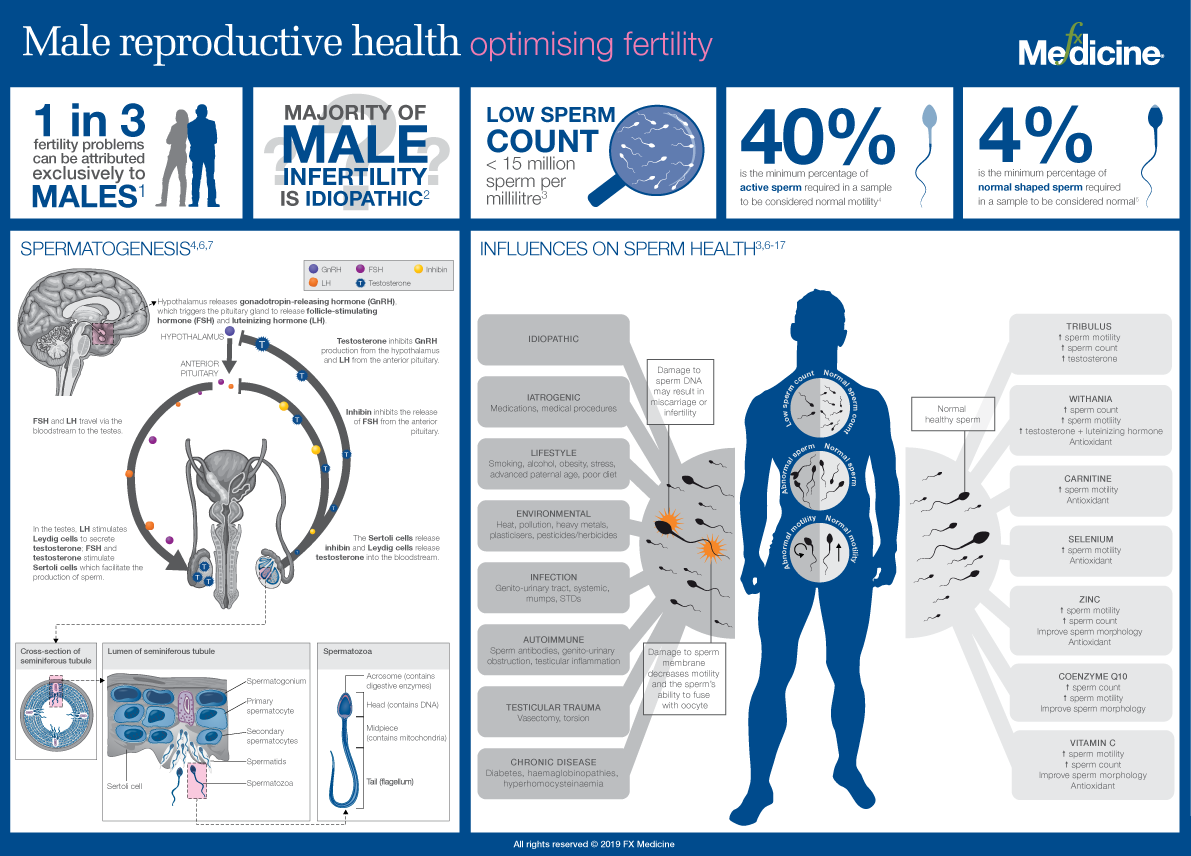While it might seem entirely natural to most people wanting to start a family, the reality is that one in six couples have trouble getting pregnant. Previously, there was a tendency to believe that if a couple couldn’t conceive, it was due to a problem on the woman’s side, but research now shows that male fertility issues account for almost half of infertility cases that are reported and treated.
The causes of male infertility are numerous and include sperm production problems, blockage of sperm transport, sexual problems, hormonal problems and sperm antibodies. However, beyond this are the underlying environmental, lifestyle and nutritional factors that must be understood if male reproductive health are to be adequately addressed. Exposure to environmental toxins, smoking, excessive alcohol use and recreational drugs have been shown to lower sperm count and motility.
It is also believed that exposure to xenooestrogens (PCBs, DDT, dioxin, pesticides, plastics) impacts sperm health. Improving nutrition, in particular, treating deficiencies of zinc, selenium, B complex and essential fatty acids, as well as maintaining adequate exercise, are essential for optimising overall fertility.
In this infographic we review the evidence in support of some important nutrients and herbs that have been shown to assist in increasing male fertility and sperm count.
References
- Quick facts about infertility. The American Society for Reproductive Medicine 2015. Viewed 9 February 2016, http://www.cdc.gov.nchs/nsfg/key_statistics.htm
- Dabaja AA, Schlegel PN. Medical treatment of male infertility. Trials Androl Urol 2014;3(1):9-16. [PDF]
- Low sperm count. Mayo Clinic 2015. Viewed 2 February 2016, http://www.ncbi.nlm.nih.gov/pmc/articles/PMC4708300/
- Healthy sperm: improving your fertility. Mayo Clinic 2015, Viewed 2 February 2016. http://www.mayoclinic.org/healthy-lifestyle/getting-pregnant/in-depth/fe...
- Menkveld R. Clinical significance of the low normal sperm morphology value as proposed in the fifth edition of the WHO laboratory manual for the examination and processing of human semen. Asian J Androl 2010;12(1):47-58. [Full text]
- Ivell R, Hen K, Anand-Ivell R. Insulin-like factor 3 and the HPG axis in the male. Front Endocrinol 2014; http://dx.doi.org/10.3389/fendo.2014.00006
- Kamischke A, Nilschlamm E. Progress towards hormonal male contraception. Trends Pharmacol Sci 2004;25(1):49-57. [Abstract]
- Protich M, Tsvetkov D, Nalbanski B, et al. [Clinical trial of a tribestan preparation in infertile men]. Akush Ginekol (Sofiia) 1983;22(4):326-329. (Article in Bulgarian)
- Ahmad MK, Mahdi AA, Shukla KK, et al. Withania somnifera improves semen quality by regulating reproductive hormone levels and oxidative stress in seminal plasma of infertile males. Fertil Steril 2010;94(3):989-996. [Abstract]
- Abd-Allah AR, Helal GK, Al-Yahya AA, et al. Pro-inflammatory and oxidative stress pathways which compromise sperm motility and survival may be altered by L-carnitine. Ovid Med Cell Longev 2009;2(2):73-81. [Full text]
- Ahsan U, Kamran Z, Raza I, et al. Role of selenium in male reproduction - a review. Anim Reprod Sci 2014;146(1-2):55-62. [Abstract]
- Scott R, MacPherson A, Yates RW, et al. The effect of oral selenium supplementation on human sperm motility. Br J Urol 1998;82(1):76-80. [Abstract]
- Colagar AH, Marzony ET, Chaichi MJ. Zinc levels in seminal plasma are associated with sperm quality in fertile and infertile men. Nutr Res 2009;29(2):82-88. [Abstract]
- Mancini A, Balercia G. Coenzyme Q(10) in male infertility: physiopathology and therapy. Biofactors 2011;37(5):374-380. [Abstract]
- Safarinejad MR, Safarinejad S, Shafiei N, et al. Effects of the reduced form of coenzyme Q10 (ubiquinol) on semen parameters in men with idiopathic infertility: a double-blind, placebo controlled, randomized study. J Urol 2012;188(2):526-531. [Abstract]
- Akmal M, Qadri JQ, Al-Waili NS, et al. Improvement in human semen quality after oral supplementation of vitamin C. J Med Food 2006 Fall;9(3):440-442. [Abstract]
- Cyrus A, Kabir A, Goodarzi D, et al The effect of adjuvant vitamin C after varicocele surgery on sperm quality and quantity in infertile men: a double blind placebo controlled clinical trial. Int Braz J Urol 2015;41(2):230-238. [Full text]
This image by FX Medicine is licensed under a Creative Commons Attribution-NonCommercial-NoDerivatives 4.0 International License.
More information about how to share/use the infographics for personal use.
If you interested in using any FX Medicine content for commercial use please contact us.
DISCLAIMER:
The information provided on FX Medicine is for educational and informational purposes only. The information provided on this site is not, nor is it intended to be, a substitute for professional advice or care. Please seek the advice of a qualified health care professional in the event something you have read here raises questions or concerns regarding your health.




